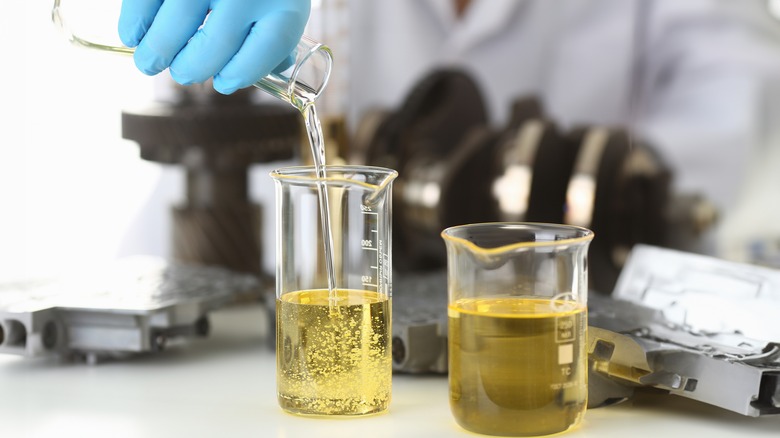
Diesel and gasoline engines might look alike under the hood, but they use oil in very different ways. Gas engines run cleaner, but diesels create much more soot, crank out higher compression forces, and run hotter,
so they need oil built for a specific job. You may have heard of YouTubers pouring diesel-specific motor oil into a gas-powered classic car, a decision that sparked endless debates about whether diesel oil is superior. Those antics highlight how differently these oils behave.
Diesel engines aren't just bigger, they operate under entirely different conditions. The diesel engine combustion process is driven by compression that's far more intense than what gasoline engines handle. That extra pressure leads to higher temperatures and produces a heavy dose of soot -– an unavoidable byproduct of diesel combustion. This soot, if neglected, can coat the internal surfaces and cause wear faster than you'd expect.
That's why diesel engine oils are crafted with more robust detergents and additives like zinc dialkyldithiophosphate (ZDDP), to combat wear and corrosion. These aren't just random enhancements -– they're needed because diesel engines operate in harsher environments. This chemistry is finely tuned to cope with high soot loads and oxidation stress
So while it's just an engine in appearance, diesel platforms demand drastically different lubrication strategies. Use the wrong oil, and you'll find out too late.
Read more: These Are The Most Forgettable Cars
Why Diesel Oil Is In A Class Of Its Own

Diesel oil isn't just thicker -– it's smarter. Designed for soot control, detergency, and corrosive resistance, it's engineered to keep diesel engines alive under relentless stress. Its higher Total Base Number (TBN) neutralizes acid buildup from combustion byproducts, and stays effective much longer than gasoline oils. In contrast, gasoline engine oil is formulated with a lighter touch, optimized for engines that burn cleaner and operate at higher RPMs but are under less stress from torque and load.
Modern diesel engines generate significantly more soot than gas engines, and diesel oil includes dispersants and detergents to prevent that soot from gumming up internals. Also, the high-pressure environment inside a diesel requires oil with shear stability, which is why diesel formulations use strong polymers to maintain viscosity under duress. Diesel engine oil uses formulas also have low-ash additives, which protect parts like DPFs and catalytic converters. Gasoline oil, on the other hand, focuses on lower viscosity. It's made for a cleaner burn and better fuel economy. It doesn't need strong acid resistance or soot control.
Here's the thing, though -- they're both doing exactly what they're supposed to. Diesel oil fights dirt and intense heat. Gasoline oil keeps things clean and efficient. They don't need those performance engine oil additives or crossover hype to prove their worth. Each one plays its role, no drama required.
When To Use What - And Why It Matters

Knowing when each oil belongs starts with identifying your engine's needs. Diesel engines must always use diesel-rated oil -- preferably one with high TBN and low-ash content -- to ensure proper lubrication, neutralize harmful combustion acids, and protect post-combustion hardware. Failure to do so can lead to clogged Diesel Particulate Filters (DPFs), acidic corrosion, and severe camshaft or bearing wear after just a few thousand miles. Gasoline-rated oil -- even if it meets API specifications -- lacks the chemical fortification to survive diesel combustion dynamics.
Some modern oils carry dual-grade labels like CK-4/SN or 5W-40, which are formulated to work in both diesel and gas engines safely -- though always, always double-check vehicle requirements before using such universal blends. Don't try to experiment on this like you're Bill Nye or else you could end up paying the price.
The bottom line is that using the correct oil prevents excessive wear, keeps emissions systems functional, and avoids expensive repairs. At the end of the day, a diesel engine will serve you well if you maintain it properly. Slap the wrong oil in it, however, and that diesel's next stop might be a teardown.
Want more like this? Join the Jalopnik newsletter to get the latest auto news sent straight to your inbox...
Read the original article on Jalopnik.












